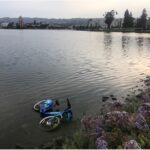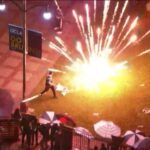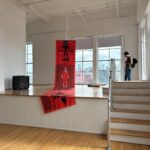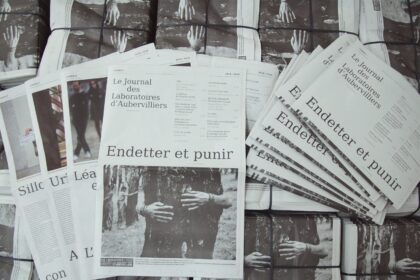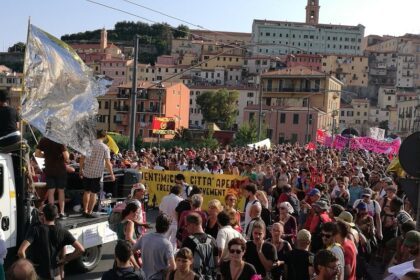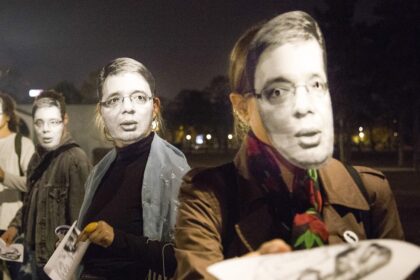Athens Is the Only Cave in the World That Has a Skylight
Georgia Kotretsos
In epigrammatic fashion, I shall chronologically outline my personal impressions and reflect on the conflicting versions of the effects that a decade of fluctuating austerity (2008–2018) has had on the Greek art landscape. I shall discuss the artists’ response to the economic crisis, specifically in the city of Athens where I reside. I shall focus on the following three areas:
- the means of art production
- creative shifts
- reactionary politicized gestures
This account is written by an Athens-based artist, and “professional spectator.”[1]
[…] – 2008:
It is important to partially contextualize the support system and means of art production in Greece before the economic crisis. The state has traditionally retained a safe distance from common practices, especially regarding direct support to contemporary artists. The kind of state grants that are pervasive in Northern Europe are a rather alien concept to Greece.
Before the economic recession, artists had three primary sources of income, yet not exclusively so:
- Sales/commissions/market-driven opportunities
- Day jobs
- Domestic funds aligned sporadically with “parental aesthetics”[2]—a practice that could be put into question (If it had been made transparent by artists systematically acknowledging and crediting the sources of those funds connected to family ties, it could have exposed the broader system’s lack of support. In reality, this last source of parental subsidy played the role of prolonger, facilitating high-visibility practices, productions, and projects that might otherwise have remained unrealized.)
The culture of the buyer was very much fostered for a number of reasons, the most obvious being there was undeniably available cabbage, keesh, cha-ching, dough, and plastic on the streets. And thereafter perforce the excess determined the direction of art production. Naturally, a product was needed to facilitate transactions and a partial or selective redistribution of wealth. Forced versions of the so-called “Greek art scene” blueprint are to be found in both soft and hardcover. When history neglects to address the longevity of art making without contextualizing its means of production, the result is a tale more suited to a bedtime story.
2009 – 2011
On Wednesday, September 9, 2009, the Greek Prime Minister of the liberal conservative political party dissolved parliament and called for an election. The ease and casualness of shutting down such an operation was unprecedented. The then-elected Panhellenic Socialist Movement will stay in power till 2011 with 160 seats out of 300.
On Friday, April 23, 2010, the Greek Prime Minister of the Panhellenic Socialist Movement announced that he had asked his European Union partners and the International Monetary Fund (IMF) to send a lifeboat by activating the first aid package, aka, a memorandum for a sinking ship, or better, the Greek bailout. Fury poured out from Paris and Berlin since France and Germany were to be the largest contributors to the package and had to gain parliamentary approval for the loan. In Athens, demonstrations hotted up; riot gear came out. The tension between the public and state authorities was brutal.
In 2011, the Prime Minister stepped down and an interim three-party coalition cabinet was formed to lead Greece out of its political and debt crisis, with a former Vice President of the European Central Bank at the helm. The second economic adjustment program was superseded by a third one.
Overnight money was no longer trendy; it went into hiding. Wealth was stigmatized and demonized due to the methods employed for its acquisition. Unemployment increased; leading figures made headlines and were targeted due to their scandalous pasts. No surprises here—socially, our profile was beginning to be dichotomized, brewing in animosity as we hungered overnight for justice in an unjust world. Spasmodic reflexes manifested in public outbursts.
2012 – 2014:
On Sunday, May 6, 2012, Greeks rushed to the polls. The Greek Supreme Court granted approval to 21 parties to participate in the election. All attempts at forming a new government in the election failed. None of the parties achieved the 151 seats needed for an outright majority. The matter was settled on Sunday, June 17, 2012, when Greeks returned to the polls. The liberal-conservatives received a majority, securing 129 seats, while the radical left won 71 seats. Right behind them in 5th place—peek-a-boo—an elephant in the room debuted. The ultranationalist, far-right took 18 seats. Seat-hoping and cabinet reshuffling had become standard practice by then.
By 2012, a good three years into the economic ordeal, the market declined while under heavy monitoring. Galleries began to shrink their programs, accounting books were put under the microscope, and artists debated whether it was worth maintaining “professional artist” as a legal status in the tax code.
Many of us rushed to terminate our studio tax registration in an effort to prevent dealing with the sweeping wave of responsibilities—new taxes and fees owed to the state—that was soon to arise, knowing we would be unable to meet them. This pivotal action redefined the legal identity of numerous artists, stripping them of their professional status and rolling out the red carpet towards the infinite dark-matter universe[3]—a territory of liberties, opportunities, and major hardships. This meant that artists were no longer able to engage in financial transactions legally, whether product- or project-based. Yet, as is so often the case, a small bathroom window was left open: €5,000 (raised to €10,000 in 2014) could be declared annually as a legal source of income related to one’s practice or otherwise as a non-registered freelancer. The status of the artist was explicitly retained by habit or by artists seeking legitimization of their status outside of Greece. Creative accounting began to flourish, an area in which Greece has never fallen short. In art-world terms, nobody was or is really bothered enough to address the matter constructively. We have all since then been flexing our creative muscles a little too far.
At the same time in 2012, baby steps towards reclaiming the city center were beginning to become evident. Between 2009 and May 2011, the city felt segregated, it seemed access had an agenda, and one was called upon to participate and pick sides when present in the civil unrest.[4] By September 2012, we demonstrated extrovert signs suggesting that we were half done with grieving our misfortunate existence.
Politics had taken its toll. It had monopolized our cosmos. The energy, time, and attentiveness taken away from our personal goals, paths, and aspirations used to tackle the unpredictable cadence of the attack can never be brought back. While politics does and did matter, the theatrical plans of action were highly dramatized and, furthermore, triggered emotions. Once that area was activated, one’s own inner dialogue and thought process was hijacked and called on to push through the pain, if possible.
In 2013, unemployment peaked at 27.5%, the real estate market became saturated with properties, and household incomes shrank. Greek nationals fled the country by the thousands. Greece will struggle to reverse this outcome, as only strong economic incentives will entice a possible return of those who have emigrated. Engineers, doctors, and other specialized professionals led the exodus. A strong argument can be made, though, that with the help of their civic performance up to that point we bullseyed on this “unforeseen” economic and identity crisis. So, I am not suggesting, but I am saying, the organic weeding at hand may serve as a much-needed anomaly, a shocker of the educated fabric in society, which may result in surprisingly unpredictable outcomes in the near future.
Those left behind were stigmatized as being defeated by the hardships that could not be absorbed by powerhouses from abroad; thus they continued to drift between states of “frenzy” and “anaesthesia.” Martialing the ever-changing facts, politics claimed and occupied the vast majority of our emotional and mental space. It proved that we weren’t truly evolving; we were not responsive to the organic changes because our present and immediate future did not mirror our idealized ideologies.
As an Athens-based gallerist put it around that time, “forget the market, our buyers are scrutinized in the papers, find other sources of income.” With things on pause, the deafening creative pulse was irregular and random. A very small number of artists were picked up by creative clusters, project driver initiatives, galleries, or dealers from abroad with extrovert veneers and established networks.
In 2013, documenta 14 (d14) announced its newly appointed director, who at first appeared to be a deus ex machina landing on a fragile terrain and whose intentions were as yet unknown. Our socio-economic and political fabric was already uncertain. Early on it was stated that Athens would play a role, but not what kind of role—lead, supporting, mere extra?

Art interest from abroad turned heads and created an expectation for outcomes focusing exclusively on the Greek socio-politico-economic mayhem. Rumors of Athens becoming the “New Berlin” took over the streets. Damn us all for being the creative dream carriers.
Thoughts, scraps, and snapshots of material that manifested sensationalized notions of the power of the masses occupying the streets began circulating and posing as artworks. As much as I personally detest collectively-focused creative proselytization, this predictable yet appealing maneuver awakened the artist in our society, which had been benched for a while. Capitalization of retinal one-liner images and in-depth critiques were on high demand across the western art-institutional universe. Artists’ long-established creative inquiries were being put on hold; they were no longer relevant.
Unaware of d14’s agenda up to that point, a premature courtship was already being put in motion. At a reactionary level—but not exclusively so—an attitude of manifesting ownership of our dark-matterness arose. Artists’ practices shifted from artwork-makers to forming and joining collectives, creating grassroots initiatives, capitalizing on existing networks, and creating platforms and websites with emphatic positioning for 19.99 bucks a month. That was the alternative outlet: claiming a creative territory by assuming a position of righteous, mature, and refined political knowledge veiled in the arrogance of one’s own convictions. We were all very much aware of it, too!
The birth of the ideologue and beyond was here to stay!
It was not the only thing here to stay: numerous artists, curators, intellectuals, journalists, and groups from abroad had recently relocated to Athens. Fresh off the boat, they introduced a piercing scent of optimism, one we could not sense for ourselves as yet. An organic grafting of artists took place as a result of the affordable cost of living and the alluring Athenian life-style.
2015 – 2017:
A pivotal moment was the Greek legislative election on Sunday, January 25, 2015. By then we had voting under our belt. The Coalition of the Radical Left won by securing 149 seats out of 300. Full-blown political psychosis kicked in when the elected prime minister formed a coalition with the opposition, the national-conservative and right-wing populist party in Greece, in order to secure an additional 13 seats, which put him in the position of acting sovereign, so to speak. At the same time, our third political force, holding 17 seats, was the ultranationalist, far-right party. In June, the banks closed for nearly twenty days and capital controls limited cash withdrawals to sixty euros per day. The referendum to decide whether Greece was to accept the bailout conditions proposed jointly by the European Commission (EC), the International Monetary Fund (IMF) and the European Central Bank (ECB) on June 25, 2015, took place on July 5, 2015.[5] The public memorably sealed the “NO” vote with an eye-burning outburst of an “Opa!” display on Constitution Square. A week later, the Greek term “kolotumba”[6] entered international political discourse. The overall atmosphere was alluring. The cocky presence of Greek machismo in the foreground allowed the radical left to sex up its political game. As a former Eurozone official put it, our finance “rider,” only 6 months in power, cost Greece roughly €200 billion. Mashallah!
The refugee crisis also peaked in 2015, and Greece sat in the eye of the storm. The NGO epidemic of an altruistic fleur on the ground was spreading rapidly.
What was the question again? Art?
That thing on the wall?
Oh! Sorry, that thing that changes the world.

Make no mistake, the majority of the speakers who paraded through the aforementioned platforms were exceptional, and we had not had access to them during the pre-crisis years. But any overdose of a good thing can leave an off-putting aftertaste.
Collectively, the talks were overwhelming—listening was a full-time job. By then, the Athenian art community felt it was being played by Jan-Ove Waldner and Zhang Jike.[7]
With a few highly memorable moments, the majority’s focus and incentives sprang from the same spring. Highly personal, highly informed, political, heartfelt, rooted in upheavals and social turmoil, overcoming struggles by concluding in a present of new realization in the form of public confessionals—a very much buried Christian practice this was.
On occasion the burdening subject matters kept our attention span short, desensitized, and unengaged. We did satisfy our need to have an opinion about it all, though, fully aware of the enduring commitment and role our presence played in the form of the spectator.
On reflection, this intellectual outbreak was timely. Polyphony was needed too, so when moderate attendance was exercised it was mostly beneficial. It gave us a reason to come out of our caves.
Present:
We are currently looking at a decade of intellectual hijacking. The artistry behind this modus operandi is the embodied duty to oppose, to resist, to fight back, which never ceases to surprise me. We were held hostage in a limbo for years, being offered enough room to exhaust our appetite by walking it off.[8]
Make no mistake—there were exceptions, individuals who had temporary or even lasting impact, who presented effective alternatives, who self-organized, who resisted all of the above with the greatest weapon of all, humor. And luckily those who thought of time as a non-linear concept had also understood that headlines already belonged in the past like shooting stars, and thus they managed to remain calmer than others.
I favor standing still and in silence very patiently. You see, our present socio-economic and political state is an accurate reflection of ourselves. One may not find comfort in it, but it is important to highlight that we are all equally discomforting to the oppositional sums of our society. Who ever promised us a world that would be aligned with our ideologies, wants, and subjective, infallible visions of the future?
And now, when you place your ear close to the ground, upon the culmination of the local art hype belonging to our recent past, you will hear my peers expressing the “blasphemous” desire of wanting to make art again, whatever that may be. Athens is a boutique of intellectual and creative capital with insufficient support and a number of nearly felted parental or other subsidies. It learns fast, but it adapts slowly.
If anything comes out of all this, it will be Athens (re)inventing itself creatively by making its own set of rules, expectations, models of success, and, most importantly, by defining creative contentment, because it can.
As hard as it has been, for the sake of my report, to convey the darkness of the first half of this era, let us not forget its closing score. It is as if we have entered a meta-episode of Tzovana Fragkouli’s popular TV series from the 1980s, “Pes to, ke the gini.” In it, she granted children their most far-fetched wishes. A great egalitarian message lies therein: “if that kid could do it, then all kids can.” And that is straight up amazing.
Athens is the only cave in the world that has a skylight. Even at night, it never gets too dark to see.
Georgia Kotretsos is a visual artist, and a professional spectator based in Athens,
Greece since 2010. She relocated to South Africa from Greece in her early teens
while the abolition of apartheid was underway. With her work, she critiques the conformity of seeing by studying, proposing and practicing liberating and anarchic approaches of looking at art in an effort to support that seeing is site-specific and spectatorial emancipation the source of our art knowledge. Through her research-based practice, she encourages speculative approaches on how knowledge is and/or could be produced.
Endnotes
[1] “Professional spectator” is a term I assumed for myself in 2016. It describes my own personal interest in the artist’s role as spectator, an active rather than passive position.
[2] “Parental aesthetics” is a term I coined in 2008 to describe a form of subsidy available to artists.
[3] Dark matter, as defined by Gregory Sholette in his book Dark Matter: Art and Politics in the Age of Enterprise Culture, is a metaphor for the sphere of marginalized artists and art workers (fabricators, installers, student interns, and even amateur artists) who are essential labor (manual, cognitive, and affective) for the maintenance and reproduction of the mainstream art world, yet who remain invisible to it.
[4] Georgia Kotretsos, Art21 Magazine, “Rambo is missing his brothers,” Art21 Magazine, January 7, 2009. http://magazine.art21.org/2009/01/07/rambo-is-missing-his-brothers/#.XBdSWISbiI0.
[5] https://en.wikipedia.org/wiki/Greek_bailout_referendum,_2015
[6] “Kolotuba,” or “Kolotoumba,” is a term coined in 2015 in response to the tactics of Greece’s once radical leftist prime minister. Results: Yes – 38.69% | No – 61.31%. Upon the outcome of the referendum on July 5, 2015, he impressively “somersaulted” by accepting an emergency financial rescue. The terms after the “kolotuba” was performed were more stringent than those he was offered to begin with. “Kolotoumba” literally means somersault.
[7] Waldner and Jike are widely recognized as the world’s greatest table tennis players.
[8] I am referring here to the endless demonstrations, riots, and assemblies in all the major cities of Greece.


